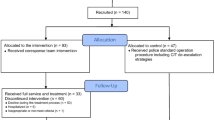Abstract
This paper examines the role of the police in supporting community based mental health services for the chronically mentally ill in a mid-sized midwestern city. Cooperation between the police and mental health system, as reflected in training and procedural agreements for emergency evaluations and hospitalization, achieves the conversion of the police to a medical model view of mental illness which stresses the importance and effectiveness of medication compliance so that the police will act upon this belief in their handling of the mentally ill. However, police recognition of the limits of the medical model and organizational change impacts upon cooperative police practices. Police experience conflict over the assumed therapeutic goals of community treatment and the important gatekeeping function community mental health systems perform under deinstitutionalization. Erosion of the police belief in the effectiveness of community mental health, and the resulting change in practices, may provide an important, yet partial, counterbalance to the control exerted by the medical model. The availability of police authority to assure compliance, or in some cases to reinforce the consequences of non-compliance with medication, raises questions about police-mental health relationships that are too cooperative.
Similar content being viewed by others
References
Bachrach, L: Deinstitutionalization: An analytic review and sociological perspective. Rockville, MD. National Institute of Mental Health, 1976.
Goldman, H, Morrissey JP: The alchemy of mental health policy: Homelessness and the fourth cycle of reform. American Journal of Public Health 75(7):727–731, 1985.
Lamb, HR: Deinstitutionalization and the homeless mentally ill. Hospital and Community Psychiatry 35:899–907, 1984.
Mosher, L., Burti, L: Community Mental Health: Principles and Practices. New York. W. W. Norton, 1989.
Brown, P: The Transfer of Care. London: Routledge and Kegan Paul. 1985.
Stein, L, Test, MA: Community treatment of the young chronic patient. In The Young Adult Chronic Patient. New Directions in Mental Health Services, 14:57–67, 1982.
Stein, L, Diamond, R: The chronic mentally ill and the criminal justice system: When to call the police. Hospital and Community Psychiatry 36(3):271–274, 1985.
Menzies, R: Psychiatrists in blue: Police apprehension of mental disorder and dangeousness. Criminology, 25(3):429–453, 1987.
Snibbe, J: The police and the mentally ill: Practices problems and some solutions. Pp. 523–532 in The Urban Policeman in Transition edited by J. Snibbe and H. Snibbe. Springfield IL: Charles Thomas. 1973.
Jacobson, D, Craven, W, and Kushner, S: A study of police referral of allegedly mentally ill persons to a psychiatric unit. Pp. 533–551 in The Urban Policeman in Transition edited by J. Snibbe and H. Snibbe: Springfield IL: Charles Thomas. 1973.
Epp, S.: Police handling of the mentally ill: Sharing responsibility with the mental health system. Journal of Criminal Justice 17:1–14. 1989.
Teplin, L: Criminalizing mental disorder: The comparative arret rate of the mentally ill. American Psychologist 39(7):794–803, 1984.
Teplin, L: Managing disorder: Police handling of the mentally ill. Mental Health and Criminal Justice Vol. 20:157–173, 1984.
Estroff, S.: Making it Crazy. Univ. of California Press, 1983.
Bittner, E.: Police discretion in emergency apprehension of mentally ill persons. Social Problems 14:278–92, 1967.
Schag, DS: Predicting Dangerousness: An Analysis of Procedures in a Mental Health Center and Two Police Agencies. Ann Arbor, MI: University Microfilms,1977.
Fox, R, Ericson, P, Salutin, L: Apparently suffering from mental disorder. Toronto, Canada. University of Toronto, Centre of Criminology, 1972.
Murphy, G: Special Care: Improving the police response to the mentally disabled. Washington, DC: Police Excutive Research Forum, 1986.
Taft, P: Dealing with mental patients. Police Magazine 3(1):21–27, 1980.
Lickey, M, Gordon, B: Medicine and Mental Illness: The Use of Drugs in Psychiatry. New York: W. H. Freeman. 1991.
Cohen, D: Social work and psychotropic drug treatments. Social Service Review, 62(4):579–599. 1988.
Baldessarini, RJ; Chemotherapy in Psychiatry: Principles and Practices. Cambridge: Harvard Press. 1985.
Balint, M: The Doctor, His Patient, and the Illness. London: Pittman Medical Publishing Company, 1960.
Scheff, T.: Being Mentally Ill. Chicago: Aldine, 1966.
Diamond, R.: Enhancing medication use in schizophrenic patients. Journal of Clinical Psychiatry Vol. 44(8):7–14, 1983.
Lipsky, M: Street Level Bureaucracy. New York: Russell Sage, 1981.
Aviram, U: Community care of the seriously mentally ill: Continuing problems and current issues. Community Mental Health Journal, Vol. 26(1):69–88.
Issac, R, and Armat, V: Madness in the Streets: How Psychiatry and the Law Abandoned the Mentally Ill. New York: Free Press, 1990.
Link, B, Andrews, H, and Cullen, F: The violent and illegal behavior of mental patients reconsidered. American Sociological Review 57:275–292. 1991.
Goldstein, H: Problem Oriented Policing. NY: McGraw Hill, 1990.
Abram, K, Teplin, L: Co-occurring disorders among mentally ill jail detainees: Implications for public policy. American Psychologist 46(1):1036–1045. 1991.
Hochstedler, E: Criminal prosecution of the mentally disordered. Law and Society Review 20(2):279–292. 1986.
Gerhart, U, Brooks, A: The social work practitioner and antipsychotic medications. Social Work 28(6):454–480. 1983.
Author information
Authors and Affiliations
Rights and permissions
About this article
Cite this article
Meehan, A.J. From conversion to coercion: The police role in medication compliance. Psych Quart 66, 163–184 (1995). https://doi.org/10.1007/BF02238862
Issue Date:
DOI: https://doi.org/10.1007/BF02238862




